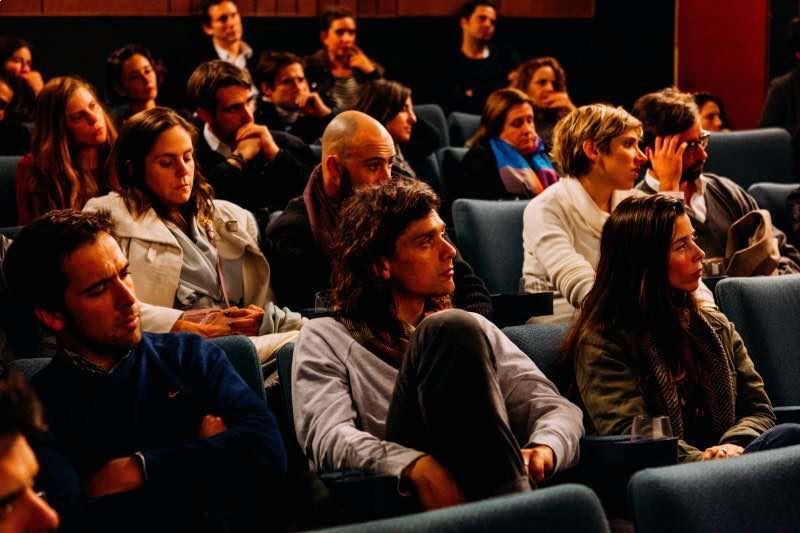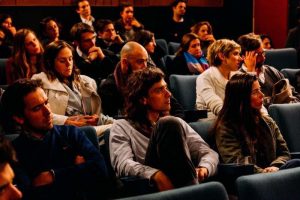Have you ever heard of the term ‘Yes, And…’ in an acting class? If you have, you have likely done some form of improv acting. Improv acting plays off of the idea that one must always say ‘Yes, AND…’ in order to successfully keep an improv scene going.
Improvisation is an entirely different type of acting and there are whole classes, troupes and theater companies devoted to it. It requires a completely different skill set and is deemed ridiculously difficult by even the most seasoned of actors. Listening is crucial in any style of acting, and it’s especially important when there’s no script. In improv, if you’re not listening to your scene partner, you’re missing most of the scene.
Improvisers use this phrase “yes, and” to create what is known as a “base reality” as they begin each scene. The base reality informs the actors and audience who the characters are, what they are doing and where they are. Once all of that has been established, the scene plays out through that imaginary reality that has spontaneously been created.
So, What Is Improv Acting?
To get technical with it, improvisation, or improv, is a genre of live theatre where the characters, plot and dialogue of a game, scene or story are made up spontaneously and without preparation. Often, Improv actors will jump start a scene based on a suggestion from the audience, some other source of inspiration to get started— perhaps an object in the space or a sound they hear outside.
Listening is crucial in any style of acting, and it’s especially important when there’s no script. In improv, if you’re not listening to your scene partner, you’re missing most of the scene.
Improv acting is unique in that one will never, ever see the same show twice, because everything is made up in that moment. Improv, in its nature, must be different every time.
Improvised shows differ depending on troupe or theater company. While Improv is typically humorous and fun, there are instances where dramatic themes are brought into the mix. The actors have no script, and they must act, direct, create and interact with each other all at the same time with zero planning or prep.
Improvisation is not a new form of theater, in fact, actors have been using this technique for centuries! Commedia dell’Arte, a form of theater which relied almost entirely on improvisation for its storytelling, dates back to 16th century Italy.
While Improvisation typically involves speech, it doesn’t always need to be verbal. It can also be a gesture, expression or choice that results in a genuine reaction from their scene partner. Garry Marshall’s movie, Pretty Woman, features an iconic moment of improv. When Richard Gere snaps the jewelry box on Julia Roberts’ hand, prompting her to erupt into a charming and spontaneous giggle fit. Yes, this was improvised and it created movie magic. Improvisation brings out creativity and bravery in performers and can make a scene more genuine and exciting.
So Where Does One Learn How To Do Improv Acting?
Most local theaters and acting studios offer some form of improv class. However, there are several programs that are famous for their impeccable improvisation training.
There is, the legendary Second City, one of America’s oldest sketch and improv institutions located in Chicago, IL. Founded in 1959, the Second City has trained countless comedy giants, including Bill Murray, Tina Fey, and Steve Carell.
Another notable program is, of course, Upright Citizen’s Brigade (aka UCB) is one of the most well known and popular institutions on both coasts. Founded by four familiar faces: Amy Poehler (“SNL,” “Parks and Recreation”), Matt Walsh (“Veep,” “Hung”), Matt Besser (“Reno 911!” “Comedy Bang! Bang!”), and Ian Roberts (“Key & Peele,” “Playing House”). UCB has become a training spot for dozens of writers and performers, including Aziz Ansari, Ed Helms, Donald Glover, Aubrey Plaza, Kate McKinnon, and Ellie Kemper.
According to Will Hines, longtime UCB teacher and author of “How to Be the Greatest Improviser on Earth,” practicing improv can help with:
- “Saying “yes”: You will at least consider saying yes to things and see the value in that option more often than you did before.”
- “Listening: Deeper, fuller, more actively”
- “Brevity: Improv rewards succinct, direct talk.”
- “Empathy: You will more easily be able to see things from other people’s points of view.”
- “Bravery: You will be more comfortable to have people see you and watch you.”
- “Being present: You’ll worry less about the future, less about story, and more about what the moment feels like and what that implies.”
- “Knowledge: You’ll learn more since you’ll run across so many scenes where someone mentions something you don’t know.”
- “Clearer opinions: You have opinions all the time but very often you don’t pay attention to them as they’re forming.”
Improvisation opens up a whole new world of possibilities to the actor and creates a truly magical experience for both the performer and audience. I hope the next time you are on stage you find yourself saying, ‘Yes, and?’
Emily Meredith

